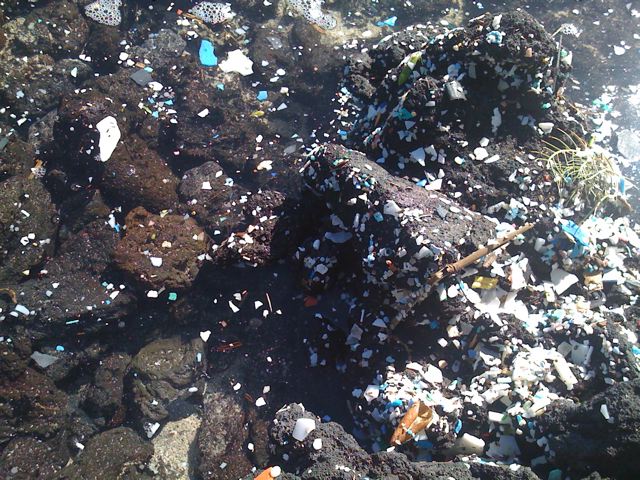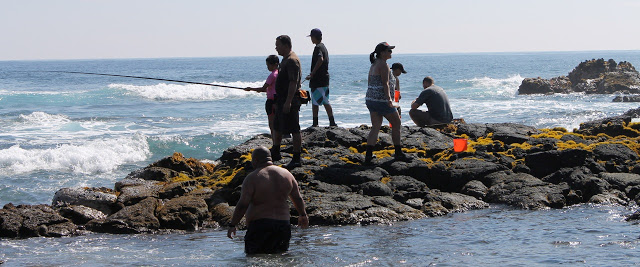 |
| Volunteers removed more that 7,300 plastic fragments from Kamilo Beach during Hawai`i Wildlife Fund's first Ka`u Coast cleanup for 2013 on Jan. 12. Photo from Hawai`i Wildlife Fund |
`AINA KOA PONO is planning to bring a 33-ton-a-day microwave depolymerization unit to its planned refinery site off Wood Valley Road for testing within the “next several months,” according to a press release issued by AKP this morning. “As you may recall,” says the press release, “AKP’s plan is to convert biomass into a crude oil using modular units of a microwave process, compressing to about an hour what in nature takes thousands, even millions of years. Our goal is a drop-in biofuel that will replace fossil fuels and provide a co-product of biochar which can be used as a soil amendment.
 |
| `Aina Koa Pono plans to bring a 33-ton per day Micro Dee unit to Ka`u within the next several months. Shown here is a 5-ton unit in North Carolina. |
“We will use the unit to run further engineering tests, perfect energy balances and test local feedstock to see which is most appropriate. The 33-ton unit will serve as the basis for expansion to our larger biofuel operation. “Once the unit is operational, we will be better able to determine if an Environmental Assessment or an Environmental Impact Statement is required,” the press release states.
NA MAMO O KAWA is the tentative name of a community group that hopes to work with all parties involved with the future of Kawa. Local fireman Lui Sales and University of Hawai`i land use student Pueo McGuire, grandson of Pele Hanoa, both grew up in Ka`u and surf Kawa. They spoke yesterday during a county-sponsored meeting on the future of Kawa.
The more than 700 acres along the coast between Punalu`u and Honu`apo is now in county hands. The two young men talked about bringing about peace between families and all those who claim rights to the place. They talked about Kawa staying low-key and respecting its traditional use by people who live in Ka`u.
Karen Teshima, an executive assistant to Mayor Billy Kenoi who led the meeting, described Kawa as a “special place” and said her own family heritage has ties there.
Teshima said that the county, as the steward of Kawa since its purchase from private property owners, decided to conduct an archaeological survey and “let Kawa settle.” She said she was there to listen to all the people.
| The future of Kawa drew a large crowd with many points of view to Na`alehu Community Center last night. Photo by Julia Neal |
She also called for peace among Hawaiians who are making claims to the area. “Don’t quibble,” she advised. Those families who don’t want to participate in the future of Kawa should step back. Those who want to be involved should work together, she recommended.
People speaking at the meeting presented many points of view. A large group came to support Abel Simeona Lui, who lived at Kawa for more than 20 years when it was owned by several private property owners. They talked about “Uncle Abel” providing lua (portable restrooms) at the beach and welcoming the surfers there over the years. Some said that Lui should be returned to live there.
One woman said that her family had Native Hawaiian ties and burials at Kawa and had been friendly with him in the past but that “Uncle Abel” more recently became hostile and intimidating to the family.
Lui denied being hostile and talked about his children being “born on the land,” at Kawa. “My children’s piko is over there on the land.” He talked about growing sweet potatoes for the surf meets and said there are about 100 ipo (gourds used for hula instruments) drying there. Lui claimed that he is in the Supreme Court still fighting over ownership of Kawa.
 |
| Wilma Holi flew in from Kaua`i and said to the community, "Don't bicker." Photo by Julia Neal |
“Who like me off the land? Who like me off the land?” asked Lui. He read from letters of support urging the return of “Uncle Moses and Uncle Abel to the land at Kawa to take care of it.” His supporters clapped their hands and blew conch shells.
A number of people talked about the current county practice of Kawa being gated and closed from 6 p.m. to 6 a.m. and hiring police to protect it, saying there was never any need to pay anyone to protect Kawa in the past.
Kauanoa Hoomanawanui, state burial site specialist for the Big Island, said she is also a descendant of Ka`u. She said during a site inspection for reconnaissance, a two-day sweep, archaeologists came across many burials, which make Kawa “almost useless to development.” She called it a “burial preserve.”
She said she wants to open a discussion with the community. “If you know of anyone buried there, fill out a descendency claim. She urged the community to become part of the planning for Kawa.
Several speakers noted that in 1980 the courts decided that there will be permanent public access to Kawa, but the county recently blocked access. Surfers, fishermen and other community groups filed suit to recover traditional access more than 30 years ago and won.
Pueo McGuire, who worked for Sen. Dan Akaka in Washington, D.C. and currently works for Office of Hawaiian Affairs in land planning while finishing his college work, said he has been going to Kawa his whole life to “surf, fish and practice my religion. I learned what it means to be from Ka`u there. I learned what it means to be Hawaiian there. The only time I have been prohibited from going to Kawa is this winter when county put up their (gates).”
He called for cooperation. “We are all looking for common ground. It is about Kawa, not about us…. The plan should be about those who really use it…. Twenty-four hour beach access is essential to Hawaiian culture. It does not start at 6 a.m. and stop at 6 p.m.,” said McGuire. He called for inclusive, cooperative planning.
John Kahiapo, from the state Department of Land & Natural Resources, said his agency is particularly interested in water – the anchialine pools and estuary. He said there is a plan to survey native fish, estuaries and habitats. “We don’t have any baseline study. We don’t know what is in the estuary or anchialine pools.” He said this kind of survey sometimes “comes up with organisms you can’t find anywhere else.”
Several speakers brought up the redevelopment of old plantation water sources mauka of the coast. “How about streams that have been shut down?” one speaker asked, claiming that by putting all the water in pipes, there are streams that are no longer being fed.
Lui Sales cautioned the county about planning too much infrastructure at Kawa. “Building big roads will invite plenty guys. We don’t want publicity,” he said. “For many of us, it it is kind of bummers.” He said the local people want continued access to surf, camp and fish. “Keep Ka`u country, and keep Kawa low-key and solid,” he said. He sized up the needed infrastructure as rubbish bins and luas. The mayor’s representative said there will be more community input as the surveys are completed.
 |
| Joni Mae Makuakane-Jarrell NPS photo by Jay Robinson |
RANGER JONI MAE MAKUAKANE-JARRELL is the new chief of Interpretation at Hawai`i Volcanoes National Park and oversees visitor services and educational and cultural programs at the park. She is the first native Hawaiian to serve in the position.
Makuakane-Jarrell has worked at all five national park units on Hawai`i Island during her 32-year park service career. She began as an interpretive ranger at Hawai`i Volcanoes through the Young Adult Conservation Corps and worked her way through the ranks, becoming the park’s supervisory ranger. Makuakane-Jarrell then worked as the interpretative specialist at Kaloko-Honokohau National Historical Park with her late husband, park ranger Steve Makuakane-Jarrell and served as a law enforcement specialist at Pu`ukohola Heiau National Historic Site.
“One of my visions for the park is sharing all the traditional Hawaiian names of places here,” Makuakane-Jarrell said. “Hawaiians are very keen observers, and when they name things, it usually tells the story or history of the area. By using these given names, it helps protect, honor and perpetuate the Hawaiian culture.”
Before becoming chief of Interpretation, Makuakane-Jarrell served for eight years as educational specialist for Hawai`i Volcanoes National Park. She coordinates the annual Cultural Festival, now in its 33rd year, and piloted the first Summer Junior Ranger Program. She also started the Na Leo Manu concerts and `Ike Hana No`eau cultural workshops at the park.
“Joni Mae brings an ideal combination of perspective into the important position of chief of Interpretation,” said park superintendent Cindy Orlando. “Her strong background of Hawaiian values and culture, combined with her leadership skills and dedication to the park’s mission, and significance as a World Heritage Site, will serve the park and its visitors very well.”
“One of my visions for the park is sharing all the traditional Hawaiian names of places here,” Makuakane-Jarrell said. “Hawaiians are very keen observers, and when they name things, it usually tells the story or history of the area. By using these given names, it helps protect, honor and perpetuate the Hawaiian culture.”
Before becoming chief of Interpretation, Makuakane-Jarrell served for eight years as educational specialist for Hawai`i Volcanoes National Park. She coordinates the annual Cultural Festival, now in its 33rd year, and piloted the first Summer Junior Ranger Program. She also started the Na Leo Manu concerts and `Ike Hana No`eau cultural workshops at the park.
“Joni Mae brings an ideal combination of perspective into the important position of chief of Interpretation,” said park superintendent Cindy Orlando. “Her strong background of Hawaiian values and culture, combined with her leadership skills and dedication to the park’s mission, and significance as a World Heritage Site, will serve the park and its visitors very well.”
 |
| More than 1.5 tons of debris were removed from Kamilo Point Jan. 12. Photo from Hawai`i Wildlife Fund |
FIFTY-ONE VOLUNTEERS JOINED Hawai`i Wildlife Fund on Saturday, Jan. 12 to help remove more than 1.5 tons of marine debris from Kamilo Point along the Ka`u Coast. Twelve volunteers from the Japanese Environmental Action Network, the Japan Ministry of the Environment, the University of Kagoshima and other Japanese NGOs concerned about March 11, 2011 tsunami debris helped out. A representative from the Ocean Conservancy in Washington, D.C. and a designer from London volunteered.
On Saturday, Feb 23 - Ocean Day - Malama Kanaloa will be held at Hilo Bayfront. Saturday, March 16 brings a cleanup event to the Ka`u Coast. Saturday. May 25 is Hawai`i Wildlife Fund’s Annual Manuka NARs Cleanup Event. Space is limited, so RSVP soon.
Ongoing anchialine pool restoration and invasive plant species removal workdays are held every month. Contact Megan Lamson at kahakai.cleanups@gmail.com or call 769-7629.
EVERY FEBRUARY, Ka Lae Quilters and Red Hat Ladies of Ka`u raise funds to support improvements to the Ka`u Hospital’s emergency room. Tomorrow, they hold a bake and craft Sale at the hospital at 10 a.m. Another sale is set for next Friday and Saturday at 8 a.m. at Punalu`u. Contributions are welcome. Call Barbara Beatty at 929-9072.
Ongoing anchialine pool restoration and invasive plant species removal workdays are held every month. Contact Megan Lamson at kahakai.cleanups@gmail.com or call 769-7629.
EVERY FEBRUARY, Ka Lae Quilters and Red Hat Ladies of Ka`u raise funds to support improvements to the Ka`u Hospital’s emergency room. Tomorrow, they hold a bake and craft Sale at the hospital at 10 a.m. Another sale is set for next Friday and Saturday at 8 a.m. at Punalu`u. Contributions are welcome. Call Barbara Beatty at 929-9072.
 |
| Author Tom Peek holds a writing workshop Saturday. Image from Volcano Art Center |
TOM PEEK, AUTHOR OF Daughters of Fire, offers a workshop open to all levels and genres Saturday from 9 a.m. to 5 p.m. at Volcano Art Center’s Ni`aulani Campus in Volcano Village. No writing experience is necessary. Fee is $85 or $76.50 for VAC members. Call 967-8222 to sign up.
BOYS & GIRLS CLUB supporters can cheer on Youth of the Year winners and raise money for the club through the purchase of tickets to the Youth of the Year banquet a week from tomorrow on Friday, Feb. 8 at 5:30 p.m. at `Imiloa Astronomy Center in Hilo. The event features inspirational speakers, awards, food and auction items. Individual tickets are $70 each. To purchase tickets in Ka`u, call Boys & Girls Club board member Julia Neal at 928-9811.
SUPPORT OUR SPONSORS AT PAHALAPLANTATIONCOTTAGES.COM AND KAUCOFFEEMILL.COM. KA`U COFFEE MILL IS OPEN SEVEN DAYS A WEEK.


.jpg)

































